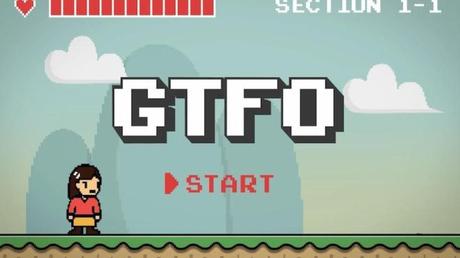
“GTFO” directed by Shannon Sun-Higginson
Despite composing the majority of video game players, women are frequently attacked within the gaming community. Though it has persisted for years, this horrifying treatment entered the public consciousness in a largely unprecedented way a year ago with the rise of Gamergate.
“Gamergate,” is “ostensibly concerned with ethics in game journalism and with protecting the ‘gamer’ identity” but in actuality “isn’t much more than a tone-deaf rabble of angry obsessives with a misguided understanding of journalistic ethics,” according to Gawker. Specifically, public female figures in the gaming community — like Zoe Quinn, Anita Sarkeesian and Brianna Wu among others — received rape and death threats and some were even driven from their homes. And the harassment has hardly abated in the intervening months.
“The truth is — you don’t recover from this, you just kind of change,” Wu told MTV. “Gamergate isn’t in the news as much, but it’s sure still present in my life.”
It’s a harrowing experience filmmaker Shannon Sun-Hugginson explores in the film GTFO. The documentary importantly not only exposes this harassment, but also elevates the dialog surrounding the phenomenon by imparting several key takeaways.
Harassment is not just annoying — it’s widespread and debilitating.
When Anita Sarkeesian decided to strategically share selections of the harassment she received “in an effort to contribute to the already ongoing conversation about online harassment” she found that the harassment only escalated — and continues to this day. While she felt empowered to share this information, she added, many women don’t.
“A lot of women aren’t in a position to share the harassment that they’re receiving because people don’t believe them, because they get ridiculed for it, and because the harassment might escalate and because they might hurt their professional careers or lose their jobs,” she explained. “Women are afraid to talk about what’s happening to them.”
Studies back up Sarkeesian’s claim: In fact, a 2014 Pew Research Study found that 26% of young women between the ages of 18-24 have been stalked online, and 25% were the target of online sexual harassment. It’s crucial to remember, therefore, that just because not all female gamers are talking about it doesn’t mean it’s not happening.
It’s not just important to end online harassment, but also to actively promote women in the gaming industry.
Although 96% of teen girls play games, the game industry overall is 10-12% female and only 4% of game programmers are female, according to GTFO.
“If you have an industry that is so unbalanced in terms of the male voice, I think it’s natural that you will also have content that is also directed at only half of the population, if not less,” Asi Burak, the President Games for Change, says in the film.
When women are involved, other perspectives are represented. For example, as the Executive Producer of the game “Journey,” Robin Hunicke helped create a main character that is not specifically gendered.
“This is something that a lot of games could explore more — leaving a little more room with the way they characterize characters in general, the way they build out gender representation of race, age,” Hunicke says in the film. “We could be a little softer with our stereotypes. Games should reflect the reality of life to the best they can while being as entertaining as they need to be.”
Games are actually an incredible opportunity to promote feminist ideals.
“For decades, the games themselves and the marketing around games have been telling boys and men that games belong to them,” Sarkeesian said, noting that this promoted a sense of entitlement and ownership over the community. This combined with anonymity, she noted, “creates a space where men feel like they can attack women.”
But because “physicality is no longer a factor,” in games, another journalist stated in the film, players are “all on the same playing field” in a way that “particularly makes misogynists uncomfortable” and calls those discriminatory beliefs into question.
In fact, many in the film concurred that despite the reality of harassment, the industry overall is slowly transforming into a more inclusive space. And the ability to create a shared identity, to expose pays to narratives and experiences that differ from their own, could produce a greater shift in the culture at large — a prospect that is certainly worthy of excitement and praise.

